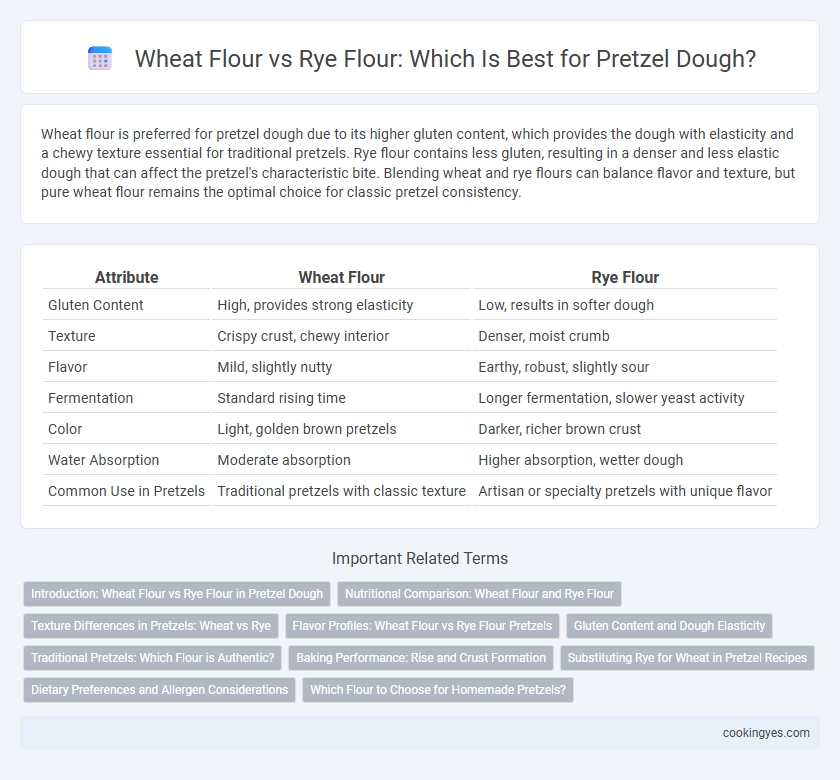Wheat flour is preferred for pretzel dough due to its higher gluten content, which provides the dough with elasticity and a chewy texture essential for traditional pretzels. Rye flour contains less gluten, resulting in a denser and less elastic dough that can affect the pretzel's characteristic bite. Blending wheat and rye flours can balance flavor and texture, but pure wheat flour remains the optimal choice for classic pretzel consistency.
Table of Comparison
| Attribute | Wheat Flour | Rye Flour |
|---|---|---|
| Gluten Content | High, provides strong elasticity | Low, results in softer dough |
| Texture | Crispy crust, chewy interior | Denser, moist crumb |
| Flavor | Mild, slightly nutty | Earthy, robust, slightly sour |
| Fermentation | Standard rising time | Longer fermentation, slower yeast activity |
| Color | Light, golden brown pretzels | Darker, richer brown crust |
| Water Absorption | Moderate absorption | Higher absorption, wetter dough |
| Common Use in Pretzels | Traditional pretzels with classic texture | Artisan or specialty pretzels with unique flavor |
Introduction: Wheat Flour vs Rye Flour in Pretzel Dough
Wheat flour, rich in gluten, provides pretzel dough with elasticity and a chewy texture essential for traditional pretzels, while rye flour, containing less gluten and more pentosans, creates a denser, slightly sour dough with a distinct flavor profile. The choice between wheat and rye flour significantly impacts the dough's hydration, fermentation time, and final crust color. Understanding the biochemical differences in starch and protein content guides bakers in optimizing pretzel dough characteristics for either classic softness or rustic density.
Nutritional Comparison: Wheat Flour and Rye Flour
Wheat flour contains higher gluten levels, providing pretzels with their traditional chewy texture, while rye flour offers more dietary fiber and essential minerals such as manganese and potassium. Rye flour has a lower glycemic index than wheat flour, supporting better blood sugar regulation and heart health. Nutritionally, pretzels made with rye flour tend to be richer in antioxidants and B vitamins, contributing to enhanced digestive benefits compared to those made exclusively with wheat flour.
Texture Differences in Pretzels: Wheat vs Rye
Wheat flour creates pretzels with a soft, chewy texture and a golden-brown crust due to its high gluten content, which provides elasticity and structure. Rye flour results in denser pretzels with a slightly grainy texture and a darker color, as lower gluten levels limit dough rise and elasticity. The choice between wheat and rye flours directly impacts the chewiness, crust crispness, and overall bite of traditional pretzels.
Flavor Profiles: Wheat Flour vs Rye Flour Pretzels
Wheat flour pretzels offer a mild, slightly sweet flavor with a tender crumb, creating the classic chewy texture associated with traditional pretzels. Rye flour pretzels present a distinct earthy, nutty, and slightly tangy taste, contributing to a denser crumb and more robust flavor profile. The choice between wheat and rye flour significantly influences the pretzel's aroma, taste complexity, and overall mouthfeel.
Gluten Content and Dough Elasticity
Wheat flour, with its higher gluten content of around 10-12%, provides superior dough elasticity essential for the classic chewy texture of pretzels. Rye flour contains significantly less gluten, approximately 5-8%, resulting in a denser and less elastic dough that can produce a heavier pretzel. Optimal pretzel dough formulations often blend wheat and rye flours to balance elasticity and flavor while maintaining structural integrity.
Traditional Pretzels: Which Flour is Authentic?
Traditional pretzels are typically made with wheat flour, which provides the ideal gluten structure for the dough's characteristic chewy texture and golden-brown crust. Rye flour, while adding a distinct earthy flavor and denser crumb, is less common in authentic pretzel recipes due to its lower gluten content affecting elasticity. Most authentic Bavarian pretzels rely on high-quality wheat flour to achieve the signature soft interior and crisp exterior.
Baking Performance: Rise and Crust Formation
Wheat flour, rich in gluten proteins, provides superior dough elasticity and structure, resulting in a better rise and a chewy, well-defined pretzel crust. Rye flour contains less gluten and more pentosans, which limit gluten network development, leading to a denser dough with a softer, less crisp crust. Bakers often blend wheat and rye flours to balance rise and develop a characteristic pretzel crust with optimal texture.
Substituting Rye for Wheat in Pretzel Recipes
Substituting rye flour for wheat flour in pretzel dough introduces a denser texture and a distinctive earthy flavor profile, enriching the overall taste experience. Rye flour's lower gluten content compared to wheat flour affects dough elasticity, requiring adjustments in hydration and kneading techniques to maintain proper structure. Incorporating rye flour up to 30% of the total flour blend optimizes flavor while preserving the characteristic chewiness and browning of traditional pretzels.
Dietary Preferences and Allergen Considerations
Wheat flour, commonly used in pretzel dough, contains gluten, making it unsuitable for individuals with gluten intolerance or celiac disease, while rye flour offers a lower gluten content but can still trigger reactions in sensitive individuals. Rye flour contributes a distinctive, earthy flavor and denser texture, appealing to those seeking alternative grains or more complex taste profiles. For dietary preferences, wheat flour suits traditional pretzel lovers, whereas rye flour caters to niche markets focusing on varied nutrition and flavor complexity, with both requiring allergen awareness in production.
Which Flour to Choose for Homemade Pretzels?
Wheat flour is the preferred choice for homemade pretzels due to its high gluten content, which provides the dough with the elasticity and strength needed for the traditional chewy texture. Rye flour, with its lower gluten levels and denser composition, results in a heavier, more rustic pretzel that lacks the characteristic stretch and softness. For authentic pretzel dough, choosing wheat flour ensures optimal rise, structure, and the signature golden crust.
Wheat flour vs rye flour for pretzel dough Infographic

 cookingyes.com
cookingyes.com